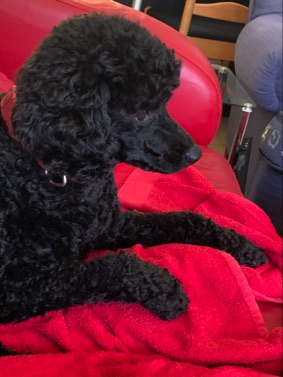The Science of Consciousness:
Chapter 5: Animal Consciousness
What this chapter is about: Which animals are conscious, and how can we tell?
I am sure Beau, my pooodle, is conscious - he is aware. I am less certain that he is self-aware, but I think he is. What about a fish? A worm?
I have written a blog about mental illness and its relation to consciousness. Existential concerns are limited to humans. Beau doesn't have a phobia about death (I think); I do.
Clarification
On p.120, when I say "when self-consciousness first appeared in humans", I do not mean to imply that only humans developed self-consciousness.
The evolution of consciousness
At some point - we don't know when and probably never will - some animals started being conscious. Were trilobites conscious? We should remember that we think of consciousness as being on a continuum, so at first some animals started being a little bit conscious. The emergence of self-awareness is more dramatic: at some point a few million years ago some animals started thinking about themselves and their consciousness.
Cave art is earlier than once thought
https://www.bbc.co.uk/news/articles/c0vewjq4dxwo
A find in the Indonesian Island of South Sulawesi showing a pig and three humans has been dated to at least 51,200 years ago, which is 5,000 older than the previously know human art work.
What is it like to be - an octopus?
The classic question is asked in the American philosopher Thomas Nagel's famous (1974) paper, What is it like to be a bat? The question is asked of bats because most would argue that they are conscious, but their consciousness must be very different from ours, because their perception makes so much use of echolocation.
However, bats aren't really that different from us. We might not be able to say exactly what it is like to be a bat, but we have some idea. More alien is the octopus, and now Nagel's classic question might be more interestingly formulated as What is it like to be an octopus? An octopus is highly intelligent, but has a very different neural anatomy from mammals, with their "brains" distributed over their bodies.
The word umwelt is used in phenomenology to describe the world as envisioned from the point of view of an animal and as experience by it.
See:
Godfrey-Smith, P. (2017). Other minds: The octopus and the evolution of intelligent life. London: Collins.
Seth, A. (2021). Being you. London: Faber & Faber.
What is it like to be - a dog?
Recent research has been exploring this question with MRI. For a summary, see this article at Psychology Today.
Read more about the work of Gregory Berns in this book:
Bern, G. (2019). What's it like to be a dog. London: OneWorld.
There has also been a surge of work on theory of mind in dogs - can they adopt another's point of view? Not surprising to me and Beau, they can. They can deceive others, and tell someone's intentions - are people meaning to tease them with that treat, or they just being inept? Again we see that it is advantageous for social pack animals like dogs to have social skills and models of others. I'm not saying they're any where as sophisticated as humans, or even chimps; for this reason some prefer the term rudimentary theory of mind.
See:
Udell MA, Dorey NR, Wynne CD. Can your dog read your mind?: Understanding the causes of canine perspective taking. Learn Behav. 2011 Dec;39(4):289-302. doi: 10.3758/s13420-011-0034-6. PMID: 21643852.
Horowitz, A. Theory of mind in dogs? Examining method and concept. Learn Behav 39, 314–317 (2011). https://doi.org/10.3758/s13420-011-0041-7
https://bigthink.com/neuropsych/dog-intelligence/
https://www.dailymail.co.uk/sciencetech/article-11674421/Dogs-tell-youre-cruel-just-clumsy-judge-it.html
Völter, C. J., Lonardo, L., Steinmann, M. G. G. M., Ramos, C. F., Gerwisch, K., Schranz, M.-T., Dobernig, I., & Huber, L. (2023). Unwilling or unable? Using three-dimensional tracking to evaluate dogs’ reactions to differing human intentions. Proceedings of the Royal Society B: Biological Sciences, 290(1991), 20221621. https://doi.org/10.1098/rspb.2022.1621
Animal dreams
Many animals clearly have dreams. I can sometimes tell when Beau is dreaming: he's rigid, his eyes are moving rapidly under their lids, and he sometimes snuffles and makes noises. I have no idea what he dreams about; happy walks, good sniffs and large chickens, I hope. I assume his dream content is related to his waking experienc in much the same way human dream content is related to our waking experience. I do wonder though what he makes of his dreams. When I wake I know I've been dreaming (except in a few very rare instances where I'm dreaming I'm awake or whatever). My self-awareness, reasoning, and meta-cognitive skills all make it easy for us to tell what is dream and what is reality. I doubt if animals have this skill. For them consciousness of reality and dreaming must be all jumbled. I don't like the idea of Beau having a dog nightmare and then thinking it was real. Of course this is all speculation on my part.
In the news
Cephalopods feel pain
On the BBC site and elsewhere in June 2021. An octopus is intelligent, sentient, and feels pain, and should be protected by the Animal Welfare (Sentience) Bill - even though they're invertebrates. Just because these animals process information in a different way from us, and lack a single brain, doesn't mean they are incapable of feeling pain - see here for the orginal Conservative Animal Welfare Foundation report. I'm surprised that anyone who knows anything about octopuses (and crustaceans including lobsters) would think otherwise.
See also:
Crook, R. J. (2021). Behavioral and neurophysiological evidence suggests affective pain experience in octopus. IScience, 24(3), 102229. https://doi.org/10.1016/j.isci.2021.102229

